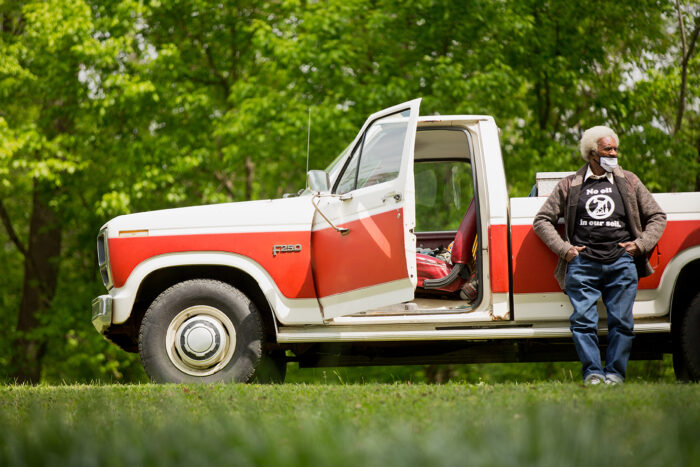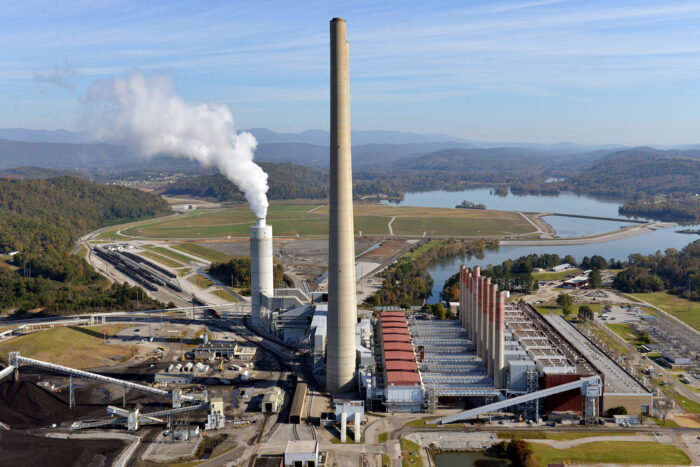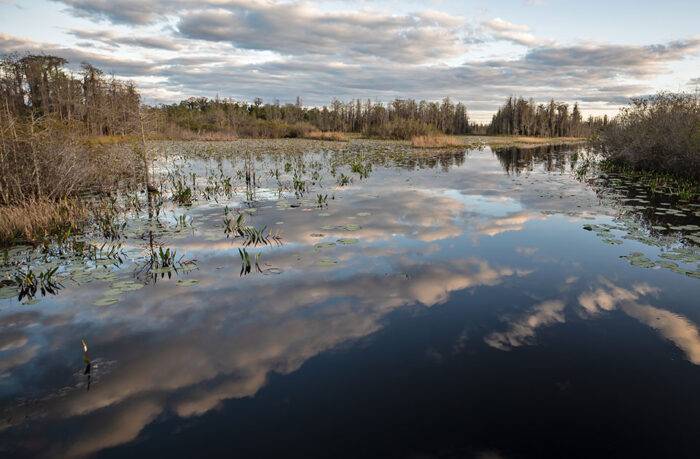Solutions start in the South
2021 Results and Priorities for 2022
At the Southern Environmental Law Center, a case is often more than just a case. We know that a win for clean water in North Carolina can strengthen the law, with sweeping impacts for drinking water across the country. Legislation preparing South Carolina coastal communities for rising seas both helps those areas and signals that real climate progress is possible, even in conservative states. Blocking new gas-fired power plants in Virginia and Tennessee protects those living nearby, but it also accelerates the broader transition to a clean energy economy. When SELC works with our partners to protect the air, water, and natural treasures in each of our six Southern states, our impact is felt across town, across the state, and across the country. Through the many twists and turns of 2021, SELC has produced powerful results on the ground while advancing environmental policy at the highest levels. With your partnership, we can continue, right here in the South, to create solutions for some of our country’s biggest environmental problems. Thank you for standing with us.
Thank you for supporting this important work.
SELC Drives Strong Climate Policy Across the Region
We are producing nationally significant climate policy from our Southern states, showing the country how to achieve climate solutions outside of traditionally progressive strongholds like California and New York. Results like these require expertise in environmental law and policy combined with an understanding of the nuances of state law and a deep knowledge of the people, politics, and places of the South. Results like these require SELC.
In Virginia, SELC played a central role in crafting the historic Clean Economy Act and other laws committing the Commonwealth to a zero-carbon electricity grid by 2050—the boldest climate legislation to ever come out of the South. We also secured Virginia’s participation in the Regional Greenhouse Gas Initiative, a collaborative, cost-effective way to drive down fossil fuel power generation.

In North Carolina, the legislature recently passed legislation setting a target to reduce power plant emissions 70 percent by 2030 and reach net zero emissions by 2050. Unfortunately, the bill, drafted behind closed doors with heavy influence from Duke Energy, lacks the teeth needed to meet that ambitious target. SELC is already ahead of that curve. Last year, we took an administrative approach and petitioned state regulators to adopt a declining cap on power plant emissions and join the Regional Greenhouse Gas Initiative. With the approval of our petition in July, North Carolina has cleared the first major hurdle on the way to net zero emissions.
And in South Carolina, SELC notched another victory in front of utility regulators, who ordered Duke Energy to change its long-term energy plan to include clean energy resources, as required by the 2019 Energy Freedom Act, a law we played a significant role in passing. We also fought back and won after Dominion Energy proposed one of the worst solar policies in the country, convincing regulators to adopt an alternative proposal that will ensure rooftop solar remains a cost-saving option for customers.
We are making sure greenwashed policies aren’t holding this progress back. SELC is raising awareness that European biomass subsidies, which were enacted with the good intention to address climate change, are actually making the problem worse. Cutting trees in the Southern U.S. to fuel power plants overseas will increase carbon in the atmosphere over the next 40 years. SELC attorneys are in the U.K. lobbying members of Parliament and working with a coalition of partners to change British climate policy. Back stateside, we are alerting the Biden administration to the dangers of supporting biomass domestically.
Virginia Leads the South in Clean Car Standards

This year, SELC was a critical leader in developing and ensuring passage of legislation making Virginia the first Southern state to adopt advanced clean cars standards. The new law will substantially cut tailpipe pollution and expand the availability of electric vehicles. Clean cars are essential to addressing climate change because the transportation sector is the biggest source of carbon emissions in the nation. The new standards will produce the greatest reduction of greenhouse gas pollution in state history by eliminating 48 million tons of carbon emissions through 2040.
Demanding Environmental Justice, from Byhalia Pipeline to Industrial Hog Farms
SELC is committed to using our expertise to help right environmental injustices across our region. As the Biden administration moves at the national level to make good on its commitment to stand up for communities of color and poorer communities unfairly bearing the brunt of environmental harm, our attorneys are on the ground doing the work, partnering with those communities and showing the administration where its resources can have a real impact.
This past summer, SELC and our local partners, Memphis Community Against Pollution and Protect our Aquifer, made history by blocking the Byhalia Pipeline, a multi-billion dollar crude oil project slated to run through historic Black neighborhoods in southwest Memphis. Working at the federal, state, and local levels, SELC helped residents of Boxtown, Westwood, and White Chapel oppose this risky and unnecessary pipeline that would have run across Memphis’ vulnerable drinking water supply.

In eastern North Carolina, SELC is demanding better practices from industrial hog facilities that are mismanaging waste from nine million swine, allowing the contamination of surface and groundwater. Nearby residents, overwhelmingly people of color, are plagued with odors and health problems. Smithfield and Dominion Energy want to reap more profits from this polluting system by converting untreated swine waste to biogas without addressing impacts to neighbors or the environment. We are challenging state air permits for a proposed processing facility.
And we have dug in our heels in north Birmingham where two coking plants sit in a majority Black neighborhood. Such plants are notoriously dirty, using ovens that burn coal to produce coke, a high-carbon fuel used for steelmaking. For ten years, the Environmental Protection Agency knew that Drummond’s ABC coke plant was leaking dangerous levels of benzene; SELC and our partners recently reached a settlement with the federal agency, the local health department, and Drummond that ensures the company will fix all leaks. We are now focused on Bluestone Coke, just two miles away, where the plant has been violating its clean air permit for over a decade. We are making sure the company is held accountable for the high levels of toxic air pollution affecting residents nearby.
In all of these cases, SELC has helped realize meaningful, local change while elevating the plight of vulnerable communities and shining a national spotlight on these persistent, historic problems.
The cancelation of the Byhalia Pipeline is a victory for the people of southwest Memphis, for the city’s drinking water, and perhaps most monumentally, it is a triumph for environmental justice.
Amanda Garcia, Tennessee Office Director
SELC is Halting the Rush to Natural Gas
To stop the unnecessary expansion of natural gas, SELC is building on the expertise and partnerships developed through our historic victory defeating the Atlantic Coast Pipeline. We’re approaching the issue from all angles, demonstrating for the courts and government agencies—at the state and national levels—that it is irresponsible to double down on another fossil fuel when utilities should be aggressively pursuing renewable energy options.
In Tennessee and Alabama, we are coordinating with our partners to oppose Tennessee Valley Authority plans to replace six coal plants with gas-fired turbines, including at two of the country’s largest and dirtiest coal-fired power plants at Cumberland and Kingston. As the country’s largest public utility, TVA’s energy decisions carry an outsized influence on the nation as a whole. We are
pressing for the adoption of a clean energy mix—with efficiency, solar, and storage—instead of this proposal, which could singlehandedly derail President Biden’s goal of decarbonizing the power sector by 2035.

Having slammed the front door on utilities’ plans to flood Virginia and the Carolinas with fracked gas via the 600-mile Atlantic Coast Pipeline, we are now working to keep them from bringing it in the back door via the 300-mile Mountain Valley Pipeline (proposed to run from West Virginia to southern Virginia) and the 75-mile Southgate extension. Our legal arguments bolstered North Carolina’s second denial of a water quality permit for Southgate, and we are now directly challenging the need for the pipeline by proving the company already has reliable, lower-cost options and should not burden its customers with an unnecessary project. Botched construction work on the MVP has already caused multiple water quality violations and resulted in extensive fines against the developers. Hundreds of water crossings currently remain unfinished, presenting serious questions about the completion of the project, so SELC is pushing the Virginia Water Board to deny its water permit to make sure no more harm is done.
In the eastern part of Virginia, SELC applied pressure until developers canceled plans to build one of two gas-fired power plants proposed in Charles City County that would bring new pollution to Black communities. As we continue our efforts to prevent the second plant, we are also challenging the state’s plans to approve a gas pipeline compressor station in Pittsylvania County without fully considering impacts on nearby communities of color.
In South Carolina, we are calling on state utility regulators to rethink the way pipelines are built and also pushing regulators to give the public and environment greater protections when gas companies propose to build new pipelines in the state. In a rural section of northern Greenville County, our attorneys are working with the local community to prevent a new natural gas pipeline that would promote sprawl and degrade waterways.
At the same time that SELC is opposing bad projects, we are pressing for more effective regulation of gas infrastructure. At the federal level and in Virginia, we are advocating for stronger regulations to prevent pipeline leakage of methane, which is responsible for 20 percent of global emissions and is 25 times more effective than carbon dioxide at trapping heat in the atmosphere. In order to reduce the South’s climate impact in the coming decades, we must reduce methane emissions.
In order to reduce the South’s climate impact in the coming decades, we must reduce methane emissions.
Holding States Accountable to Clean Water Protections
As the 50th anniversary of the Clean Water Act approaches, SELC is working to fulfill the promise of this landmark environmental law. We are bringing a suite of strategic lawsuits to hold our Southern states responsible for their obligations under the Act and to highlight for the Biden administration the importance of restoring and enforcing strong, durable federal protections for our nation’s waters and wetlands.

We are on the ground in Georgia defending the Okefenokee National Wildlife Refuge from a proposed 12,000-acre titanium mine. Twin Pines Minerals took advantage of the 2020 rollbacks, whereby nearly 400 acres of wetlands “lost” Clean Water Act protections overnight. Now that a federal court has invalidated the Trump administration’s lax regulations, SELC is working to reinstate federal protections on the site while we push the Biden administration to develop new safeguards that will protect wetlands like these across the country. At the same time, we are using our legal expertise to apply pressure to Georgia’s environmental agency to deny four state environmental permits for the mine.
Shifting issues, SELC is raising the alarm about the threat of industrial toxins. We achieved significant success in North Carolina through our court-ordered consent agreement with the Chemours Company, which resulted in a 99.9 percent reduction in PFAS discharges into the Cape Fear River. Although all states are legally required to regulate this kind of pollution under the Clean Water Act, they aren’t doing their job. SELC is going state by state to hold polluters and lax state regulators accountable. Our win in North Carolina sets a strong standard that can be replicated by the EPA and state environmental agencies to control this dangerous pollution.
Championing the South’s Most Remote, Unspoiled Places
SELC is an ardent advocate for our protected public lands, where the air is clear, the water pristine, and wildlife and people can find refuge. The first critical step in keeping the South’s wild lands wild is making sure the federal government follows its own rules.
We recently secured protections for Cooper Creek, a section of the Chattahoochee National Forest near Blairsville, Georgia. After years of work to keep the Forest Service from reneging on its obligations to protect undeveloped areas, the agency agreed to a settlement that will prevent any future commercial logging at Cooper Creek. A testament to SELC’s staying power, this win sends a message to the Forest Service that we are serious about holding it accountable to the commitments it makes in its forest management plans.
In coastal South Carolina, SELC put a stop to the commercial harvesting of horseshoe crabs at Cape Romain National Wildlife Refuge. The refuge is a stop-over for migratory birds including threatened Rufa red knots, which fly all the way from South America to Cape Romain, where they feed on nutrient-rich horseshoe crab eggs before continuing their journey to the Arctic. Prior to our involvement, the Fish and Wildlife Service willingly allowed the illegal harvest of horseshoe crabs from the refuge, upsetting the delicate natural balance of this protected area. After SELC went to battle in court, the agency announced that harvesting is no longer allowed to continue without prior approval, effectively ending this bad practice.
